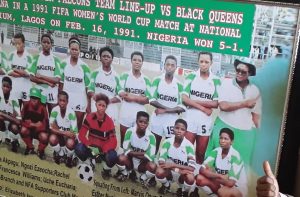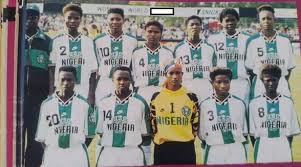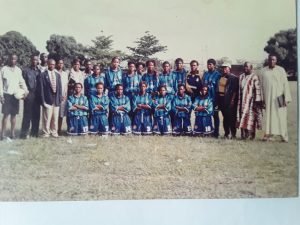By Harry Awurumibe, Africa’s No.1 Women Football Journalist
Continued from yesterday ***

Pioneer Super Falcons Class of 1991 FIFA Women’s World Cup final are products of domestic women’s football leaque
For example, a Lagos-based Princess Jegede Babes FC travelled up North several times to honour their away games including to Maiduguri, the capital of Borno state to do battles with El Kanemi Queens of Maiduguri and to Mangu Township Stadium in Jos North to play against Tin City Queens FC handled by ex-Super Falcons Head Coach, Alhaji Ismaila Mabo.
Also, Omidiran Babes of Oshogbo and Oladimeji Tigress FC of Ilorin travelled to Calabar and Port Harcourt to confront Pelican Stars and Rivers Angels FC just as Kakanfo Queens of Abeokuta owned by late MKO Abiola’s wife, Chief (Mrs) Simbiat travelled across the country for their away games.
Then it was a strong field of 20 clubs with each team playing a total of 38 matches before a champion club could emerge. This was how top clubs like high-flying Ufuoma Babes FC of Warri; Pelican Stars and Rivers Angels became undisputed NWFL champions.

Home-based All…Super Falcons Class of 1995 pose before a match in FIFA Women’s World Cup final in Sweden.
There was no gainsaying the fact that the women’s football league was well organised by the pioneers who even formed the Nigerian Female Football Organisers Association (NIFFOA) which later became Nigerian Female Football Proprietors Association (NIFFPA) after the leadership of the pressure group met with the then Chairman of Nigeria Football Association (NFA) late Justice Chuba Ikpeazu who advised the group to make the name change to be recognised by the NFA at a meeting held in Lagos on March 14, 1989. Led by Abisuga, NIFFPA made women’s football popular in Nigeria afterwards.
Today, the reverse is the case as the so-called NWFL Professional is everything but professional because the current structure is faulty and those put incharge of the women’s league and those at the helm of affairs at Nigeria Football Federation (NFF) Women’s Football Department do not have a good understanding of the foundation of women’s football in Nigeria.
The NWFL which produced 100% of Super Falcons players that played in three FIFA Women’s World Cup in 1991, 1995 and 1999, did not produce a single player in the just concluded World Cup in Australia and New Zealand. Deborah Abiodun who was listed as Rivers Angels joined Pittsburgh Panthers women’s soccer club before the competition kicked off while captain Onome Ebi actually joined Abia Angels to keep fit because she was Europe-based.
Truth be told, the current women’s football league reduced to an abridged format with the surviving 14 clubs in Nigeria divided into Group A and B with seven teams each cannot produce a team that will compete with top clubs from other countries in Africa.

For the Good of Women’s Football…Female Football Interest Group (FFIG) All Star FC sponsored by some patriotic Nigerian journalists and coaches to provide strong force to push Super Falcons to perfection in 1990s and beyond. Members include Harry Awurumibe (in suit), Dapo Sotiminu, late Henrietta Ukaigwe (Ankara gown) and Coach Rowlanson Odeh (far right). Picture taken before Super Falcons vs FFIG All Star match at Obasanjo Farms Hotel pitch in Otta, Ogun state in 19991.
This new format has resulted to the 14 clubs playing fewer games in a full season with each club in the group playing only 12 matches in one year hence the introduction of another contraption called “Super 6 Play-Off”. It involves three top clubs in Group A and B having another round of matches in a chosen venue to determine the champion team.
Unfortunately, it was this type of league that produced Rivers Angels that was not able to compete favourably in the maiden CAF WCL in Egypt in 2021 and Bayelsa Queens in Morocco in 2022 respectively.
Sadly, Nigerian clubs can no longer compete in West Africa Zone and with clubs from countries that never introduced women’s football league when Nigeria was dominating Africa.
It is therefore foolhardy for anyone to believe that Nigeria’s women’s football teams including the Super Falcons will continue to dominate Africa when the conveyor belt or supply chain (the women’s football league) is faulty and needs immediate overhaul.
It calls to question the manner of “Premier Women’s Football League” being currently organised in Nigeria when the champions of the same league could be roundly beaten by clubs from the West African sub-region.
It will not be wrong to argue that women’s football was at its best in Nigeria in the 1990s and 2000s when astute women’s football administrators were incharge at clubs and national team levels, a period the Super Falcons was unplayable in Africa and a force at world level by reaching the quarter final of the 1999 FIFA Women’s World Cup in the United States of America (USA).
Interestingly, the feat by the Super Falcons was achieved with 100% Nigerian women’s football league players and all indigenous coaches, defeating European and Asian top nations, Denmark and North Korea on the way to the quarter final clash with Brazil.

Pioneer Sponsor….UK-born MR. IAIN NELSON, ex-PepsiCo/7Up Bottling Co Plc National Marketing Manager facilitated the first multi-million Naira sponsorship for Nigeria Women’s Football League, Challenge Cup and Super Falcons for some years.
Until the present NFF leadership takes the bull by the horns and declare a State of Emergency on women’s football in Nigeria and also set up a Special Taskforce to retool the game, the time will come when Nigerian clubs and the national teams will qualify for the continental and global football competitions.
Luckily, some of the pioneers are still alive and well and can be brought closer to the football house to contribute to the revitalization of the game in Nigeria and bring the country back to the top in Africa where South Africa, Morocco and Egypt are currently occupying.




 Sports Revelation Online ..breaking authenic sports reports
Sports Revelation Online ..breaking authenic sports reports